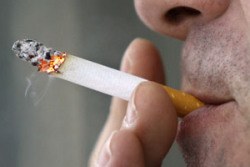Why do major depression and nicotine addiction often occur together in middle aged people? This is what Dr. Qiang John Fu, assistant professor of community health in biostatistics at Saint Louis University School of Public Health, asked himself and he conducted a study involving 3,360 pairs of middle-aged, predominantly Caucasian twins to find out. Twin studies are a powerful tool to sort out environmental factors from genetic factors. In this particular study the twins had served in the Vietnam war and 45% were fraternal, the rest were identical twins. With identical twins 100% of the genes are identical while the fraternal twins share about half of the genes.
The researchers found that a group of twins who were addicted to nicotine also had a behavioral disorder, called conduct disorder. This can be well defined with psychological tests and is characterized by behaviors such a stealing, fighting, vandalizing, running away from home and drug addiction (including addiction to nicotine). They were also the ones who were much more vulnerable to develop major depression. As published in the June issue of Twin Research and Human Genetics Dr. Fu, MD, PhD, the lead researcher explained that he found a set of genes that are responsible for the development of major depression and for addiction to nicotine.
These individuals attempt to self-treat depression with cigarette smoking. Linked with this can also be the conduct disorder mentioned above. These findings may lead to newer approaches in terms of treatment.
Reference: June issue 2007 of Twin Research and Human Genetics
Last edited December 5, 2012






